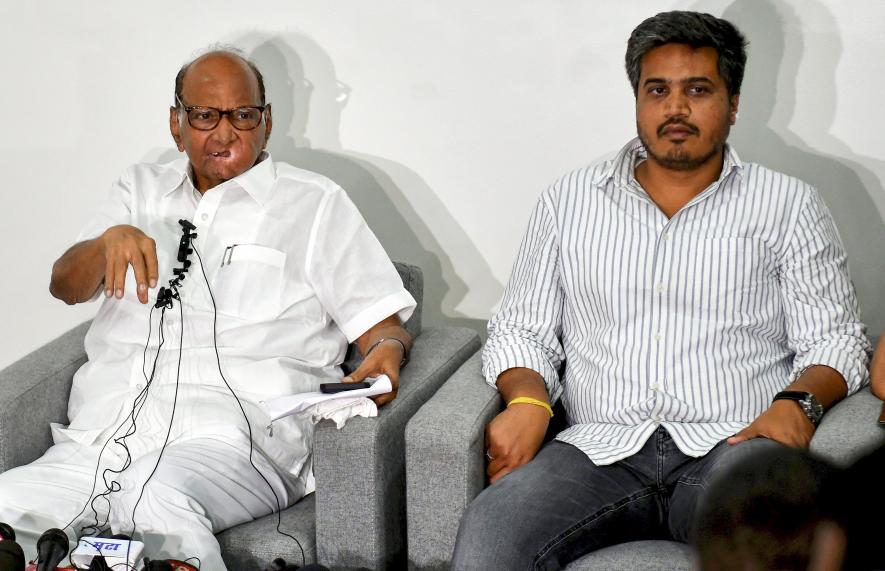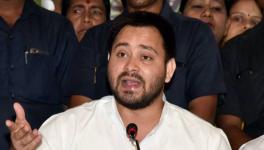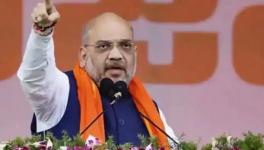Gentle Reminder: BJP Would Love to Pull a Maharashtra in Bihar

Nationalist Congress Party (NCP) President Sharad Pawar with party MLA Rohit Pawar speaks during a press conference at his residence, in Pune, Sunday, July 2, 2023. Image Courtesy: PTI
Nationalist Congress Party chief Sharad Pawar’s statement right after Sunday’s political upset in Maharashtra is a telling reminder of the high stakes involved in next year’s Lok Sabha election. Pawar senior attacked Prime Minister Narendra Modi for the exodus of his party’s top leaders, led by his nephew Ajit Pawar, to join his Bharatiya Janata Party. He said his leaders had been “restless” in the wake of the Enforcement Directorate’s investigations against them.
The Enforcement Directorate has been hot on the heels of Ajit Pawar. Of course, that chase ends now, with Ajit taking the oath as the Deputy Chief Minister in the Eknath Shinde Cabinet. It is Ajit’s fifth stint as the second-in-command in Maharashtra, and observers would say that’s still not a plum enough post to engineer a full-scale defection from his uncle’s party. Eight other NCP leaders have joined Shinde’s council of ministers with Ajit Pawar.
The Enforcement Directorate had pursued Pawar junior in connection with the allegedly “multi-crore irrigation scam” and other financial irregularities related to the Maharashtra Cooperative Bank. But Sharad Pawar “thanked” the Prime Minister for taking the NCP leaders off his chest “just days after accusing the party of large-scale corruption”. “He (Modi) has freed all of them of the allegations now,” the NCP president said.
In Opposition circles all over the country, the Bharatiya Janata Party is roundly accused of using the central investigating agencies to “blackmail” Opposition parties’ leaders. Of course, the BJP has huge financial resources at its disposal to “buy” leaders who can replace their parties’ governments with BJP ones.
Just about a year ago, over 40 MLAs of the Shiv Sena led by Shinde were transported by a chartered flight to BJP-ruled Assam and other places. Subsequently, Shinde took over as the Maharashtra Chief Minister, replacing Uddhav Thackeray, who was the leader of the Maharashtra Vikas Aghadi government.
The BJP, following the 2019 state election, had only 106 MLAs in the 288-strong Maharashtra Assembly—far below the numbers required to form the government. Still, the BJP had its way and installed Devendra Fadnavis as Chief Minister, with some “help” from the governor. But the minority Fadnavis government fell on its face within days, paving the way for the Shiv Sena-Congress-NCP alliance, which proved its majority and formed the government.
The BJP, however, did not relent. It has now managed to wrest the Shiv Sena and NCP MLAs to its side, while central investigating agencies “probed” them. Within a year took place what is described in Opposition circles as “Operation Lotus”, aided with the BJP’s “washing machine”, in which the stain of corruption is washed off leaders who join the Hindutva party.
In fact, the BJP under the stewardship of Modi and Union Home Minister Amit Shah, has successfully experimented with similar tactics in many other states in the past. Despite losing the previous elections in Karnataka and Madhya Pradesh in 2018, it resorted to horse-trading on a massive scale and replaced the Congress governments with its own.
But Bihar is Different
While splitting the Shiv Sena in June and July 2022, the BJP embarked on an effort to split the Janata Dal (United) of Bihar Chief Minister Nitish Kumar. Nitish was running the government with the support of the BJP. His party has 45 MLAs against the BJP’s 77 in the 224-strong Bihar Assembly.
Nitish, however, dropped the BJP and joined the Rashtriya Janata Dal-Congress-Left Mahagathbandhan, also known as the Grand Alliance in Bihar. The JDU accused its lone minister then in the Modi Cabinet, Ram Chandra Prasad Singh, popularly known as RCP, of “playing ball” with the BJP to split the JDU.
Having sensed (in the nick of time) that the BJP was using RCP to execute another “Operation Lotus” in Bihar, Nitish spent no time in axing RCP, dumping his ally and joining the grand alliance. It all happened swiftly. Another JDU Member of Parliament in the Rajya Sabha, who shifted his loyalty to the BJP, is the Deputy Chairman of the Upper House, former journalist Harivansh Narayan Singh. “Harivansh has sold his soul and pen to the BJP”, JDU spokesperson Neeraj Kumar recently said.
But the actual credit for disallowing the BJP to play a Maharashtra, Karnataka and Madhya Pradesh in Bihar goes to Lalu Prasad Yadav, his son and Bihar Deputy Chief Minister Tejashwi Yadav and their party, the Rashtriya Janata Dal (RJD). Indeed, it is the perhaps among the few parties in the country today that have never even “flirted” with the BJP and Hindutva or communal forces.
Lalu, his family and party-men never succumbed to the BJP’s “blackmail” with the central agencies or the “inducement” of riches and power that it undoubtedly is in a position to offer those who are loose with their convictions. Lalu has spent more than four years in jail after his conviction in cases related to the so-called fodder scam. Still, he never cow-towed to the Prime Minister’s party, nor made statements that would appear like a compromise with the hardline groups that back the BJP’s socially divisive plans.
And Lalu has paid the price. Except him, almost all the accused and convicts in the fodder cases got bail but the court repeatedly denied Lalu bail despite his ill-health. The Central Bureau of Investigation opposed releasing Lalu vociferously every time it could. Lalu is finally out on bail after completing the statutory half of his sentences in prison.
Now the CBI and Enforcement Directorate have lodged new cases related to the alleged handing over of two IRCTC hotels to private operators and for giving jobs in Railways in lieu of land against Lalu and his family members. The cases are allegedly related to Lalu’s tenure as the Railway Minister from 2004 to 2009. The CBI had closed these cases in 2011, but reopened them in 2017. The investigating agencies have repeatedly questioned Tejashwi Yadav too, and there are apprehensions of his impending arrest. Lalu’s daughter and Rajya Sabha Member of Parliament Misa Bharti has also been questioned by the CBI. The investigating agencies have questioned Tejashwi’s wife and his other sisters who are not in politics.
But Tejashwi has emerged as an apt example of ‘like father like son’. If Lalu never succumbed to the BJP’s machinations, Tejashwi has repeatedly said that like his father, he would keep fighting the BJP “come what may”.
Epicentre of Opposition
Every time the BJP forms a government in a state where it did not score an electoral victory, it is a crushing blow to the parties that won those elections. It puts more pressure on Opposition parties to try and score ever-larger margins of victory, which is a tough challenge in India’s money and muscle-power-dominated elections, where the BJP has garnered the biggest shares of election funding.
But Bihar, though among the least resource rich states in the country, can still be the model for politics India needs. This is because it has been the epicentre of people’s movements for over 50 years. Though a poor state, whose elected MLAs are also not as wealthy as their counterparts in Maharashtra, Karnataka, Goa or elsewhere, its politics has remained rooted in a consciousness that permeates its people and their representatives.
The epicentre of Jayaprakash Narayan’s movement calling for ‘Total Revolution’ the 1970s was in Bihar. Many Opposition-party MLAs had resigned from their membership of the Assembly when Bihar had a Congress government with Abdul Ghafur as its Chief Minister. What the leaders of Bihar did helped galvanise Opposition parties across the country and, for the first time, in 1977, the JP movement led to the ouster of the Indira Gandhi-led Congress government at the Centre.
Bihar also played a pivotal role in removing the Rajiv Gandhi government in 1989 and the Atal Bihari Vajpayee government in 2004. It Is therefore hardly incidental that it has emerged as the epicentre of Opposition politics against the current regime, too.
Just last week, 16 parties converged in Patna, Bihar, on the call of Chief Minister Nitish Kumar and vowed to dislodge the Modi-led government in the 2024 Lok Sabha election. It is a truism that politics is the art of the possible—but politics also throws up alternatives when none are seemingly in sight. Opposition parties can seen the BJP’s game plan, but need not lose sight of their goal for a pro-people agenda to replace today’s divisive and cynical politics.
The author is a senior journalist, media educator, and independent researcher in social anthropology. The views are personal.
Get the latest reports & analysis with people's perspective on Protests, movements & deep analytical videos, discussions of the current affairs in your Telegram app. Subscribe to NewsClick's Telegram channel & get Real-Time updates on stories, as they get published on our website.























